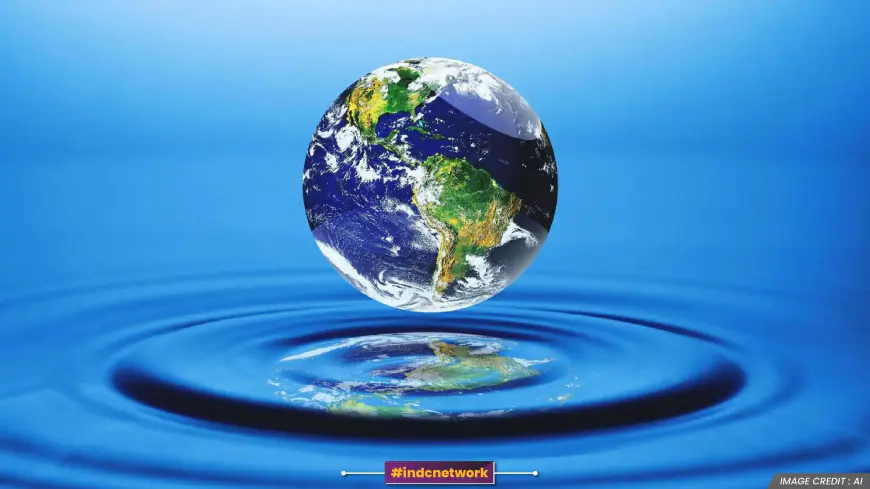Introduction : Water is an essential resource for life, ecosystems, and economies. However, the world is facing a growing water crisis, exacerbated by climate change, population growth, urbanization, and unsustainable consumption patterns. According to the United Nations, over 2 billion people live in water-stressed countries, and by 2025, two-thirds of the world’s population may face water shortages. In this context, sustainable water management has become critical to ensuring that this precious resource is conserved, efficiently used, and effectively managed.
Sustainable water management encompasses various practices and strategies aimed at optimizing water use and protecting water resources for future generations. This article delves into the principles of sustainable water management, focusing on conservation and efficiency practices across different sectors, including agriculture, industry, and urban areas. Additionally, it examines the importance of integrated water resources management (IWRM), innovative technologies, community engagement, and policy frameworks in promoting sustainable practices.
Understanding Sustainable Water Management
1. Definition of Sustainable Water Management : Sustainable water management refers to the careful and efficient use of water resources to meet current and future demands while maintaining the ecological balance of aquatic and terrestrial ecosystems. It involves a holistic approach that considers the interconnectedness of water supply, demand, quality, and ecosystem health. Key principles include:
- Conservation: Protecting and preserving water resources from depletion and pollution.
- Efficiency: Optimizing water use to minimize waste and reduce consumption.
- Equity: Ensuring fair and equitable access to water resources for all communities.
- Resilience: Building systems and practices that can withstand and adapt to climate change and other pressures.
2. The Importance of Sustainable Water Management : The importance of sustainable water management cannot be overstated, particularly in the face of global water challenges. Key reasons for its significance include:
- Water Scarcity: As demand for water continues to rise, sustainable practices are crucial to ensure that sufficient quantities of clean water are available for all sectors, including drinking, agriculture, and industry.
- Ecosystem Protection: Sustainable water management helps protect and restore aquatic ecosystems, which provide critical services such as water purification, flood regulation, and habitat for biodiversity.
- Climate Resilience: With climate change exacerbating water scarcity and altering precipitation patterns, sustainable practices enhance communities' resilience to extreme weather events, droughts, and floods.
- Economic Stability: Efficient water use can reduce operational costs for businesses and agricultural producers, contributing to economic stability and growth.
Conservation Practices in Water Management
1. Water Conservation in Agriculture : Agriculture is the largest consumer of freshwater, accounting for approximately 70% of global water use. Implementing water conservation practices in agriculture is vital for ensuring food security while minimizing water waste. Key practices include:
- Drip Irrigation: This method delivers water directly to the roots of plants through a network of tubing and emitters, reducing evaporation and runoff. Drip irrigation can improve crop yields while using significantly less water compared to traditional irrigation methods.
- Soil Moisture Management: Utilizing soil moisture sensors and monitoring systems can help farmers determine the optimal time for irrigation. This practice prevents overwatering and ensures that crops receive the right amount of moisture.
- Crop Selection and Rotation: Choosing drought-resistant crop varieties and practicing crop rotation can improve water efficiency and reduce reliance on irrigation. Farmers can adapt their planting strategies based on local climate conditions to maximize water use.
- Rainwater Harvesting: Capturing and storing rainwater for irrigation can reduce dependence on groundwater and surface water sources. Implementing rainwater harvesting systems can provide a supplementary water supply during dry periods.
2. Water Conservation in Urban Areas : Urban areas are significant consumers of water, and implementing conservation practices can help reduce overall water use. Strategies include:
- Water-Efficient Fixtures and Appliances: Encouraging the use of low-flow faucets, showerheads, and toilets can significantly reduce water consumption in households and commercial buildings. Promoting water-efficient appliances, such as dishwashers and washing machines, can further enhance conservation efforts.
- Smart Water Meters: Installing smart water meters allows consumers to monitor their water usage in real-time, helping them identify leaks and areas for improvement. These meters can provide valuable data for utility companies to manage water supply more effectively.
- Green Infrastructure: Incorporating green infrastructure, such as rain gardens, permeable pavements, and green roofs, can help manage stormwater and reduce runoff while promoting groundwater recharge. These systems enhance urban resilience to flooding and improve water quality.
- Public Awareness Campaigns: Educating residents about the importance of water conservation and providing practical tips for reducing water use can foster a culture of sustainability within communities.
3. Water Conservation in Industry : Industries are major consumers of water, and implementing conservation practices can lead to significant savings. Strategies include:
- Water Recycling and Reuse: Industries can implement systems to treat and reuse wastewater within their operations. This practice not only conserves freshwater resources but also reduces wastewater discharge into the environment.
- Process Optimization: Conducting water audits and assessing production processes can help identify opportunities for reducing water consumption. Implementing water-efficient technologies and practices can lead to significant reductions in water use.
- Employee Training: Providing training for employees on water conservation practices and the importance of efficient water use can create a culture of sustainability within organizations.
- Sustainable Supply Chain Management: Industries can engage suppliers in sustainable water management practices, ensuring that water conservation extends throughout the supply chain.
Efficiency Practices in Water Management
1. Integrated Water Resources Management (IWRM) : IWRM is a holistic approach to water management that considers the interconnectedness of water, land, and ecosystems. Key components of IWRM include:
- Stakeholder Participation: Engaging communities, industries, and government agencies in water management decisions ensures that diverse perspectives are considered, leading to more effective solutions.
- Data-Driven Decision Making: Utilizing data and scientific research to inform water management decisions enhances the effectiveness of conservation and efficiency practices.
- Ecosystem-Based Management: Integrating ecosystem health into water management strategies helps maintain the ecological balance and ensures the sustainability of water resources.
2. Water-Efficient Agricultural Practices : In addition to conservation, implementing efficiency practices in agriculture can optimize water use. These practices include:
- Precision Agriculture: Utilizing technology such as GPS and remote sensing to monitor crop health and soil moisture allows farmers to apply water more accurately, reducing waste.
- Cover Cropping: Planting cover crops helps retain soil moisture, reduce evaporation, and prevent erosion, enhancing water efficiency in agricultural systems.
3. Urban Water Efficiency Initiatives : Urban areas can adopt various efficiency practices to optimize water use:
- Water Audits: Conducting water audits for municipal water systems helps identify leaks and inefficiencies in distribution networks. Addressing these issues can significantly reduce water loss.
- Smart Irrigation Systems: Implementing smart irrigation systems that use weather data and soil moisture levels to optimize watering schedules can lead to significant water savings in parks, gardens, and agricultural fields.
4. Technological Innovations : Innovations in water management technology can enhance efficiency and conservation efforts:
- Remote Sensing and Drones: These technologies allow for real-time monitoring of water resources, identifying leaks, and assessing water quality. They enable more precise management of water supplies.
- Artificial Intelligence (AI) and Machine Learning: AI and machine learning algorithms can analyze water usage patterns, predict demand, and optimize resource allocation, enhancing overall water efficiency.
Community Engagement in Water Management
1. Building Community Awareness : Engaging communities in water management is crucial for promoting sustainable practices. Community awareness programs can:
- Educate Residents: Providing information about water conservation practices, the importance of water resources, and local water issues fosters a culture of sustainability.
- Encourage Participation: Involving community members in water management decisions can lead to more effective and equitable solutions. Citizen science initiatives, such as water quality monitoring, can empower residents to take an active role in protecting their water resources.
2. Collaboration with Local Organizations : Collaboration with local organizations, NGOs, and governmental agencies can enhance community engagement efforts. These partnerships can:
- Facilitate Resource Sharing: Local organizations can provide valuable resources, knowledge, and expertise to support sustainable water management initiatives.
- Leverage Funding Opportunities: Collaborative efforts can attract funding and grants for community water projects, enhancing their feasibility and impact.
Policy Frameworks Supporting Sustainable Water Management
1. Regulatory Frameworks : Governments play a crucial role in promoting sustainable water management through regulatory frameworks that establish standards, guidelines, and incentives for conservation and efficiency practices. Key components include:
- Water Rights and Allocation Policies: Establishing clear water rights and allocation policies can help manage competing demands for water resources, ensuring equitable access and sustainable use.
- Incentives for Conservation: Providing financial incentives for water conservation practices, such as rebates for water-efficient appliances or subsidies for sustainable agricultural practices, encourages widespread adoption.
2. Integrated Planning and Management : Governments should adopt integrated planning approaches that consider the interconnectedness of water, land, and ecosystems. This includes:
- Long-Term Water Management Plans: Developing comprehensive water management plans that incorporate conservation, efficiency, and sustainability goals ensures a coordinated approach to water resource management.
- Collaboration Across Sectors: Engaging stakeholders from various sectors, including agriculture, industry, and urban planning, in water management decisions fosters holistic solutions.
3. International Cooperation : Water scarcity is a global challenge that requires international cooperation. Collaborative efforts among countries can enhance sustainable water management through:
- Transboundary Water Agreements: Establishing agreements between countries sharing water resources ensures equitable access and sustainable management.
- Knowledge Sharing and Capacity Building: Promoting knowledge sharing and capacity building among nations can enhance best practices and innovative solutions for sustainable water management.
Case Studies in Sustainable Water Management
1. Israel’s Water Management Success : Israel is a global leader in sustainable water management, implementing innovative technologies and practices to address water scarcity. Key strategies include:
- Desalination: Israel has invested heavily in desalination technology, providing a significant portion of its water supply from seawater.
- Recycled Water: The country recycles approximately 90% of its wastewater for agricultural use, reducing reliance on freshwater sources.
- Drip Irrigation: Israel pioneered drip irrigation technology, allowing for efficient water use in agriculture.
2. Singapore’s Integrated Water Management : Singapore has developed a comprehensive water management strategy known as the "Four National Taps," which includes:
- Local Catchment: Maximizing rainwater collection through an extensive network of drains and reservoirs.
- Desalination: Investing in desalination technology to augment water supply.
- Water Recycling: Implementing advanced wastewater treatment processes to recycle water for various uses.
3. California’s Sustainable Water Practices : California faces significant water challenges due to drought and population growth. The state has adopted various sustainable water management practices, including:
- Sustainable Groundwater Management Act: This legislation promotes the sustainable management of groundwater resources, ensuring equitable access and conservation.
- Water-Efficient Landscaping: Encouraging residents to adopt drought-tolerant landscaping practices reduces water consumption in urban areas.
4. Rainwater Harvesting in Rajasthan, India : In Rajasthan, India, community-driven rainwater harvesting initiatives have helped combat water scarcity in arid regions. These initiatives include:
- Traditional Methods: Utilizing traditional methods of rainwater harvesting, such as "taankas" (underground storage tanks) and "johads" (check dams), to capture and store rainwater.
- Community Participation: Engaging local communities in the construction and maintenance of rainwater harvesting systems promotes ownership and sustainability.
Conclusion : Sustainable water management is essential for addressing the global water crisis and ensuring the availability of clean water for future generations. By implementing conservation and efficiency practices across agriculture, industry, and urban areas, we can optimize water use, protect ecosystems, and enhance resilience to climate change.
Key strategies include integrated water resources management (IWRM), innovative technologies, community engagement, and supportive policy frameworks. Successful case studies from around the world demonstrate the potential for sustainable water management to mitigate water scarcity and promote environmental stewardship.
As individuals, communities, industries, and governments, we must commit to adopting sustainable practices that prioritize water conservation and efficiency. By working together, we can create a water-secure future that meets the needs of all people while safeguarding our planet's precious water resources.














































































































































































